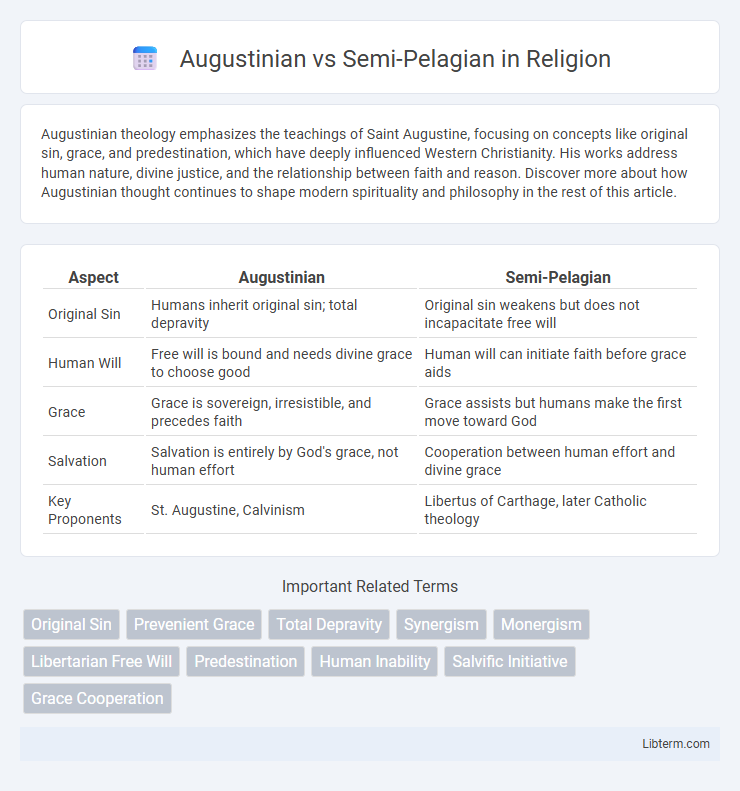Augustinian theology emphasizes the teachings of Saint Augustine, focusing on concepts like original sin, grace, and predestination, which have deeply influenced Western Christianity. His works address human nature, divine justice, and the relationship between faith and reason. Discover more about how Augustinian thought continues to shape modern spirituality and philosophy in the rest of this article.
Table of Comparison
| Aspect | Augustinian | Semi-Pelagian |
|---|---|---|
| Original Sin | Humans inherit original sin; total depravity | Original sin weakens but does not incapacitate free will |
| Human Will | Free will is bound and needs divine grace to choose good | Human will can initiate faith before grace aids |
| Grace | Grace is sovereign, irresistible, and precedes faith | Grace assists but humans make the first move toward God |
| Salvation | Salvation is entirely by God's grace, not human effort | Cooperation between human effort and divine grace |
| Key Proponents | St. Augustine, Calvinism | Libertus of Carthage, later Catholic theology |
Introduction: Defining Augustinianism and Semi-Pelagianism
Augustinianism emphasizes divine grace as the essential cause of human salvation, asserting that original sin has completely incapacitated human free will. Semi-Pelagianism acknowledges the necessity of grace but maintains that the initial step toward faith can be made by human effort without prior divine intervention. Both theological positions address the nature of grace, free will, and human responsibility in the process of salvation.
Historical Context and Origins
The Augustinian view emerged in the 4th and 5th centuries, shaped by St. Augustine's writings during the Pelagian controversy, emphasizing divine grace as essential for salvation and human inability to initiate faith. Semi-Pelagianism arose in the early 5th century as a moderate response, mainly in southern Gaul, proposing human free will could cooperate with grace to begin faith, countering both Pelagian denial of original sin and strict Augustinian predestination. These theological positions reflect early Christian debates on human nature, sin, and grace that significantly influenced Western Christian doctrine.
Key Theological Differences
Augustinian theology emphasizes predestination, total depravity, and the necessity of divine grace for salvation, asserting that humans cannot initiate faith without God's prior intervention. Semi-Pelagianism, in contrast, teaches that the human will can cooperate with God's grace, allowing individuals to make the first step toward faith through free will. The key theological difference lies in Augustine's view of grace as irresistible and initiating salvation versus Semi-Pelagianism's belief in human ability to commence the process of redemption.
Doctrine of Original Sin
The Augustinian doctrine of original sin emphasizes total depravity, asserting that humanity inherits both guilt and corruption from Adam's first sin, necessitating divine grace for salvation. Semi-Pelagianism acknowledges the reality of original sin but maintains that human will retains an initial capacity to seek God, cooperating with grace in the process of salvation. These contrasting views fundamentally shape Christian understandings of sin, free will, and the necessity of grace in human redemption.
Human Nature and Free Will
Augustinian theology asserts that human nature is fundamentally corrupted by original sin, rendering free will incapable of choosing good without divine grace. Semi-Pelagianism contends that human nature retains an innate ability to initiate faith and good works, emphasizing a cooperative role of free will alongside grace. The debate centers on whether free will is entirely incapacitated by sin or partially operative in the process of salvation.
Role of Divine Grace in Salvation
Augustinian theology asserts that divine grace is absolutely necessary for salvation, emphasizing total human depravity and the inability to choose God without prior grace. Semi-Pelagianism acknowledges human free will's initial role in turning toward God but maintains that grace is essential for completing the salvation process. The fundamental difference lies in Augustine's insistence on prevenient grace as the initiating force, whereas Semi-Pelagians allow a cooperative human response before grace's full action.
Notable Proponents and Opponents
Augustinian theology is notably championed by St. Augustine, who emphasized original sin and divine grace as essential for salvation, opposing Pelagian views that downplayed human depravity. Semi-Pelagianism, represented by figures like John Cassian and Faustus of Riez, proposed a cooperative approach where human will initiates faith before divine grace fully intervenes. Opponents of Augustinian doctrine often include Semi-Pelagians challenging the exclusivity of grace, while Augustinians criticize Semi-Pelagianism for undermining the necessity of prevenient grace.
Impact on Church Doctrine and Councils
Augustinian theology, emphasizing original sin and divine grace's necessity for salvation, profoundly shaped Church doctrine and was affirmed in councils like the Council of Carthage (418) and the Council of Orange (529), condemning Semi-Pelagian views. Semi-Pelagianism, advocating for an initial human effort in salvation, was declared heretical, reinforcing doctrines of grace's primacy and human depravity, influencing later theological developments. These doctrinal decisions solidified Augustine's influence on Western Christianity's understanding of sin, grace, and free will.
Modern Relevance and Legacy
Augustinian theology emphasizes predestination and divine grace as essential for salvation, shaping contemporary Protestant doctrines like Calvinism and influencing modern Christian views on human depravity and grace. Semi-Pelagianism, which advocates for human free will initiating faith before grace, continues to impact dialogues on human cooperation in salvation, reflected in some Arminian and Wesleyan traditions. The ongoing theological debate informs ecumenical discussions and pastoral approaches to grace, faith, and free will within modern Christian communities.
Conclusion: Lasting Influence on Christian Thought
Augustinian theology emphasizes total human depravity and the necessity of divine grace for salvation, shaping Western Christian doctrine on original sin and predestination. Semi-Pelagianism, advocating for human free will initiating faith with divine aid following, influenced more moderate views within Eastern Christianity and some Protestant traditions. The enduring impact of Augustine's ideas is evident in Reformed theology, while Semi-Pelagian thought contributed to ongoing debates about grace and free will across Christian history.
Augustinian Infographic

 libterm.com
libterm.com